Innovations in a wheelchair have come a long way in the form of highly specialized sports wheelchairs. Today, almost all indoor and outdoor games have been adapted to accommodate individuals with disabilities who would like to participate despite their physical limitations. A large chunk of the adapted sports is adapted to be played sitting on wheelchairs. In this write-up, we are discussing different types of sports wheelchairs used in different games.
Why Different Wheelchairs for Different Sports?
You might wonder why we need different wheelchairs for different sports. Why the same wheelchair can’t be used in all sports? Well, the simplest answer to this is that different games require different features in a wheelchair to increase the efficiency and safety of the player. You might know players of basketball, tennis, football, etc. wear different types of shoes while participating in the sports. It is the same case with wheelchairs.
Let us understand this with a few examples to make the point clearer to you.
- If a basketball player chooses to use a wheelchair used for tennis, they may play the best but wouldn’t survive in the field due to the bumps and crashes inevitable in the sports of basketball. The wheelchair designed for basketball is designed to keep the players safe even when they bump into each other.
- Basketball wheelchairs are higher than racing chairs and require much more strong hands and back. While playing basketball players constantly need to stop and change direction. This would certainly require a different mechanism than a racing chair that needs to go super fast in one direction. Both of these chairs can’t replace each other on the field or track.
- A marathon chair cannot be the same as a racing chair as the ultimate goal is different. A racing chair needs to be as fast as it can but during a marathon, a player needs a wheelchair that may not be as fast but should conserve energy so that the player can stay on track for a long.
- A rugby wheelchair is designed to hook and hold other players while the front of a basketball chair is designed such no players get stuck with each other when they collide. The rules of the game require these differences in the features of wheelchairs.
Different Wheelchairs Designed for Different Sports
Now that you understand very clearly why different sports require different types of wheelchairs, we can now see what types of wheelchairs are used for what sports. A point worth mentioning here is that wheelchairs are not only customized for sports but also for individuals. So basic features of the wheelchair for particular sports will be the same for every player but they might have some customizations based on their physical limitation. After all, players need to feel their wheelchairs as an extension of their bodies.
Wheelchair for Basketball
There are two basic requirements of a wheelchair used for basketball – a rigid frame and an ant-tipping system. Each player in a basketball team may have a different wheelchair depending on their physical limitations and abilities.
The players are categorized on a point basis from points 1.0 to 4.5. This categorization is based on the players’ functionality. For example, a player paralyzed waist down will receive a lower classification as compared to an amputee. The lower the classification, the lower the height of the seat for enhancing stability and balance.
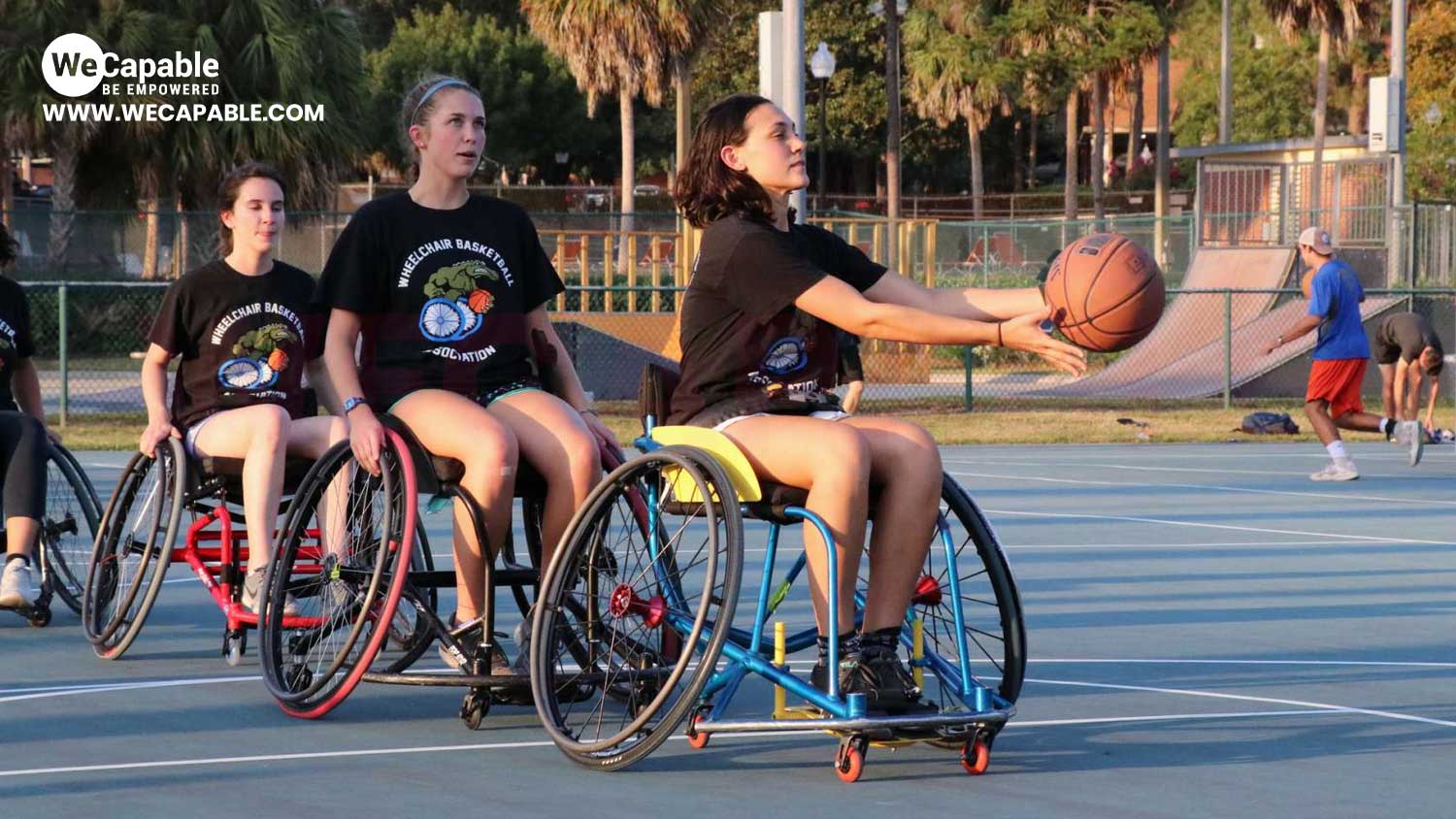
A low point chair typically has two castor wheels in front and one in back to enable the player to reach for the ball without tipping. While the high-point chair generally has a wheelbase with four castor wheels evenly dispersed to allow the player to reach forward and backward without flipping the chair.
The rear wheels are cambered to provide a wide base to the wheelchair for better stability and balance.
Wheelchair for Racing
A wheelchair for racing is also called a handcycle and many people are of the view that they should not be classified as a wheelchair. This is the most unique-looking wheelchair. You can see them as a combination of a wheelchair and a racing cycle. These are ultra-lightweight and are designed to maximize speed. The basic design includes a fork-like frame with two rear wheels and a similarly big wheel in the front. There are a few different types of racing wheelchairs.
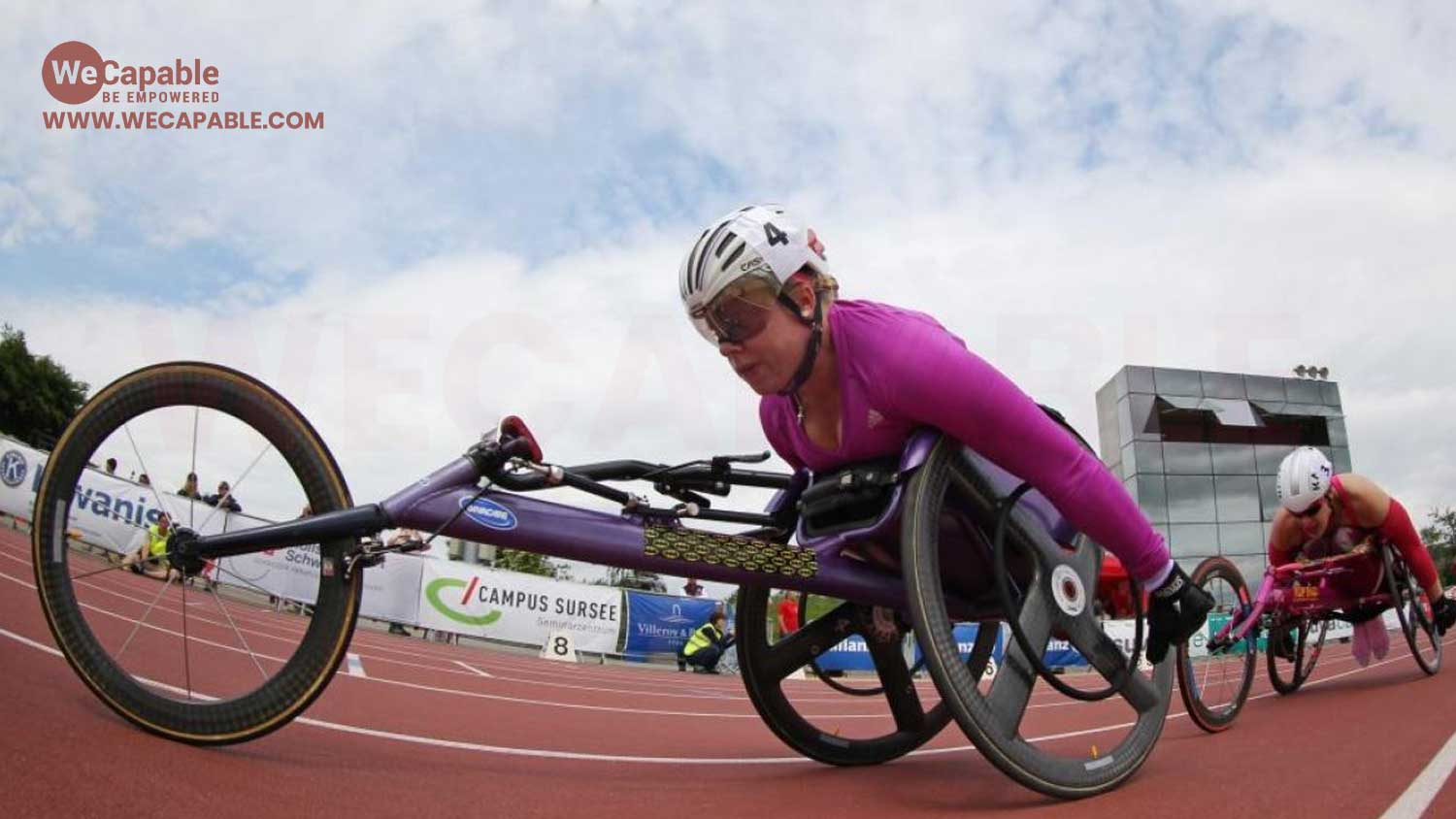
- Upright Handcycle – This is the most basic handcycle and is typically used by beginners and those who try handcycling recreationally. The higher center of gravity allows the user to have full control of speed and distance.
- Recumbent Handcycle – This handcycle features a fork-style steering system with three to seven speeds. The maximum speed however is capped at 15 mph.
- Fork-steer system – This is the most common type where a single frame turns independently when the user controls a shaft. The wheelchair is versatile and can be used by persons with mild to severe disabilities.
- Lean-to-steer system – This uses a two-piece frame. The rider needs to lean to turn the front wheel and requires some mastery. This is typically used by people with lower levels of disability.
Wheelchair for Tennis
The defining feature of a tennis wheelchair that makes it different from a regular wheelchair is its extended wheels in the front. The extended front wheels are important to allow the player to lean forward for shots without tipping over.
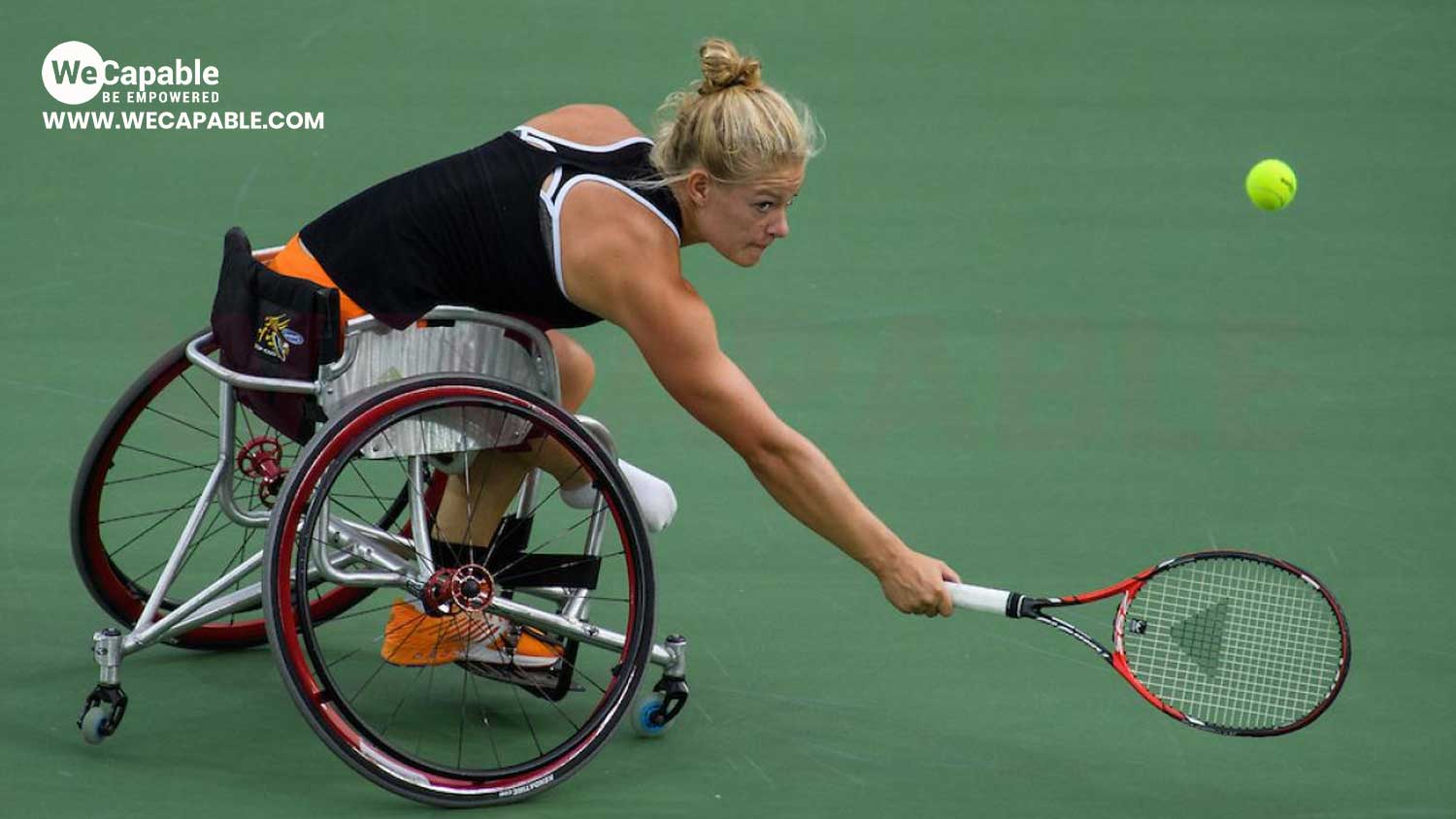
The wheels are cambered to provide maximum flexibility and speed required at the court. Like all other sports wheelchairs, they are made with light and strong materials like aluminum, carbon fiber, and titanium.
Additionally, there are straps across the waist and thighs to keep the players secure in their seats and to avoid any accidental fall.
Wheelchair for Rugby
They are perhaps the sturdiest wheelchairs as Rugby is a high-contact sport in which the players collide against each other too often. Interestingly. Rugby wheelchairs are also called ‘murderball’ after a 2005 American documentary movie of the same name about Wheelchair Rugby players.
The wheelchair dimensions are according to the players but there are very particular specifications given by sports organizations. The most striking feature is the front strong bumper that is designed to strike or hold the opponent. There are basically two types of Rugby wheelchairs – offensive and defensive.
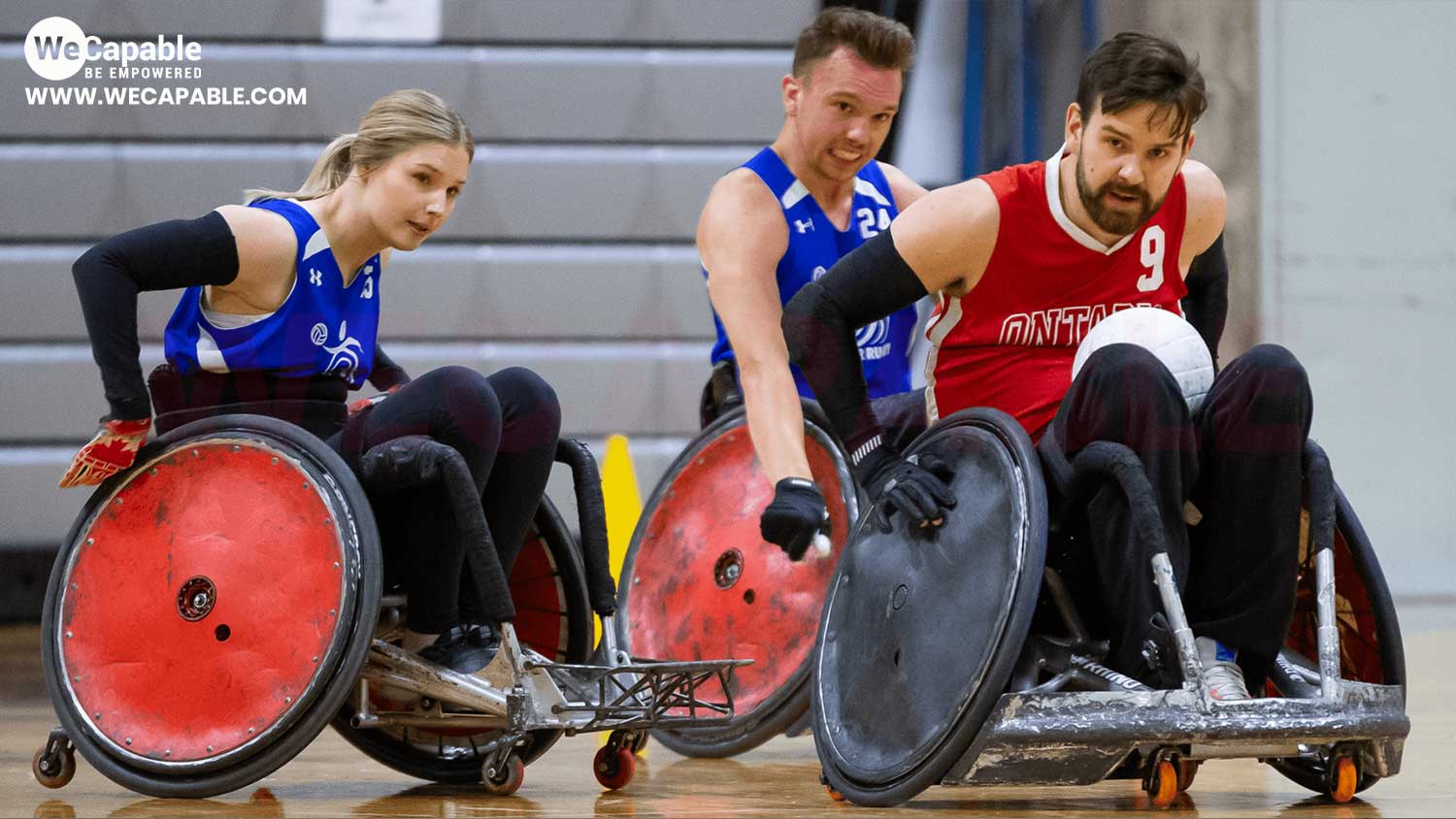
Offensive wheelchairs have front bumper with wings that keeps any wheelchair from latching and holding it back. On the other hand, defensive chairs have bumpers designed to hook the opponent’s wheelchair and restrict it from moving forward.
The back of the chair has a strong anti-tip mechanism to prevent any player from falling off. And, spoke protectors are used to saving the wheels from any damage.
Electric Wheelchairs for Sports
While most adapted wheelchair sports allow only manual wheelchairs, two sports have been specifically designed for power wheelchairs – power soccer and power hockey.
The power wheelchair used for power soccer is the typical power chair with an additional footplate bumper. Players have to go behind the ball as done in a regular soccer game and use their footplate bumper to kick the ball.
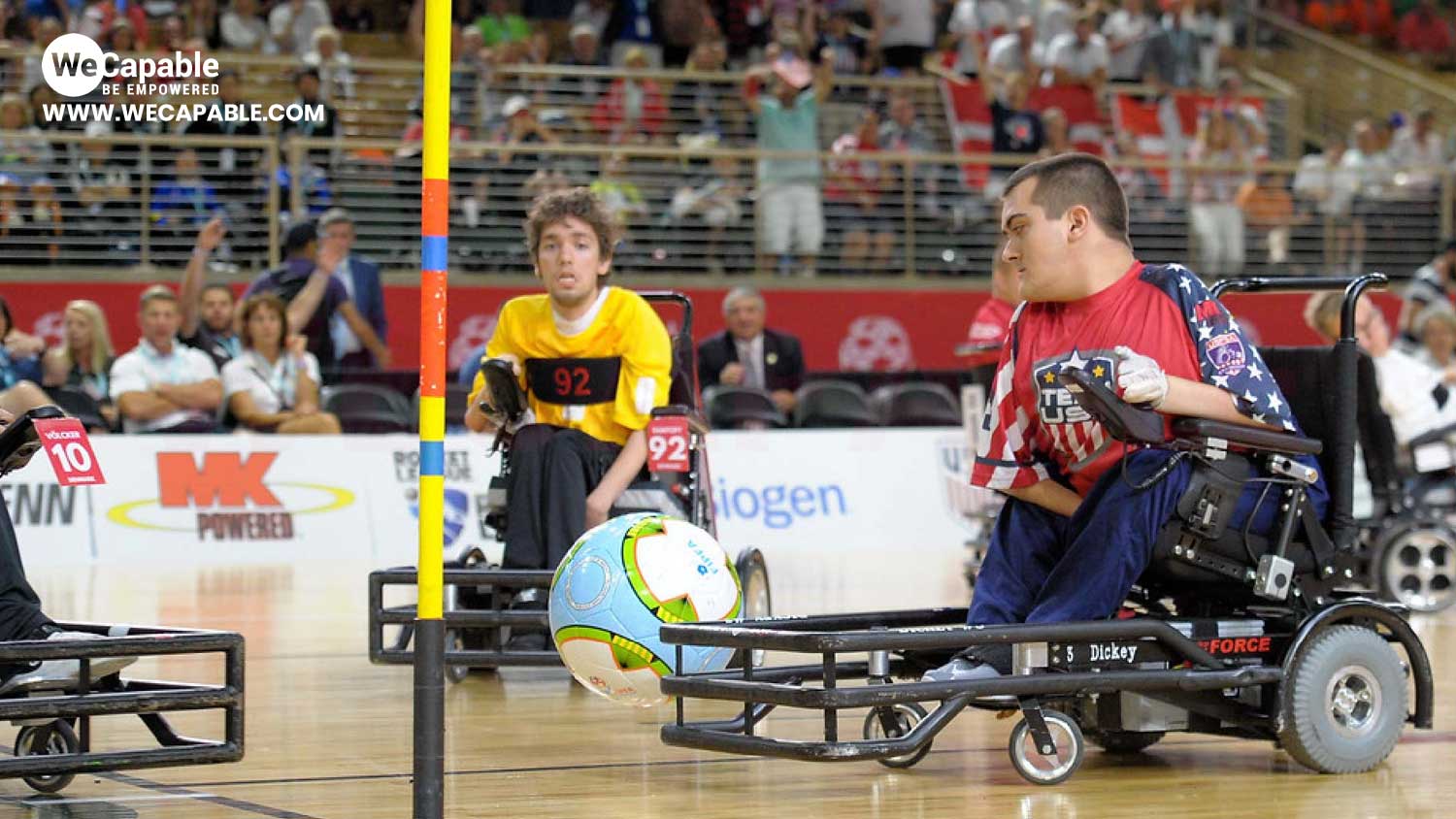
Power hockey is played similarly on a power wheelchair where the player has got two options. If the player can hold a hockey stick in their hands they will play with it. If they can’t hold a hockey stick in their hands they are allowed to attach it to their wheelchair and play it like using a footplate bumper in power soccer. The ball used in power hockey is a small plastic ball.
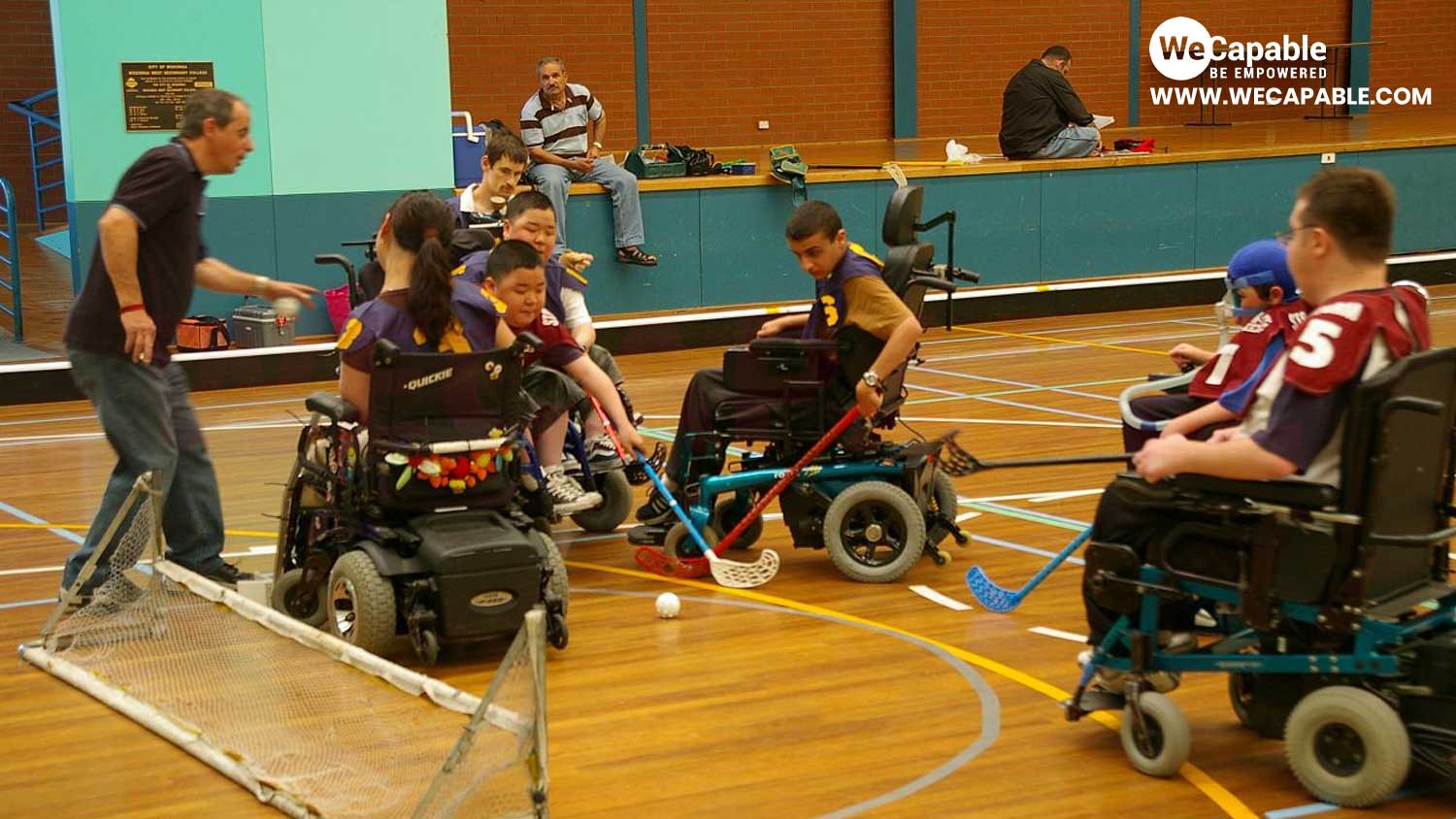
Conclusion
Sports federations all over the world are getting more and more inclusive. Innovations in adaptive wheelchairs are one of the most important advancements allowing people with physical limitations to be a part of the sporting community. If you are someone with a physical limitation interested in any competitive or recreational sport, you can very well participate in them if you are equipped with the right knowledge and equipment.
Use the citation below to add this article to your bibliography
"Types of Sports Wheelchairs: Tennis, Rugby, Basketball, Racing etc.." Wecapable.com. Web. July 27, 2024. <https://wecapable.com/sports-wheelchairs-types-tennis-rugby-basketball-racing/>
Wecapable.com, "Types of Sports Wheelchairs: Tennis, Rugby, Basketball, Racing etc.." Accessed July 27, 2024. https://wecapable.com/sports-wheelchairs-types-tennis-rugby-basketball-racing/
"Types of Sports Wheelchairs: Tennis, Rugby, Basketball, Racing etc.." (n.d.). Wecapable.com. Retrieved July 27, 2024 from https://wecapable.com/sports-wheelchairs-types-tennis-rugby-basketball-racing/

Leave a Reply